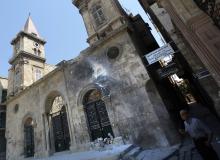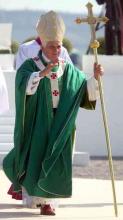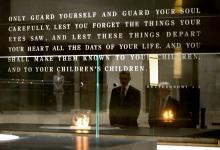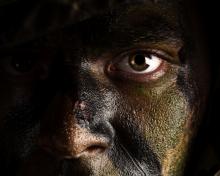syria

WASHINGTON — The persecution of Christians “vastly rose” in 2012 as radical Islamists consolidated power in Africa, according to Open Doors, a Christian missionary organization which publishes an annual list of offending nations.
Increasing threats to African Christians can be seen in focused attacks, such as the killings of Christians in Nigerian churches by the radical Muslim group Boko Haram, but also in the greater prevalence of radical Muslims in government, according to the California-based Open Doors.
In Mali, for example, which made the biggest leap on the “World Watch List,” from unranked in 2011 to No. 7 in 2012, a coup in the north brought fundamentalist Muslims to power.
“The situation in the north used to be a bit tense, but Christians and even missionaries could be active,” said Open Doors spokesman Jerry Dykstra.
Members of the Syrian opposition generally want a democratic government that protects the rights of minorities, though many also want a constitution based on Islam, according to a recent survey.
Their aspirations are important because the Obama administration has said it is refraining from arming the opposition, which has been pummeled by Syrian security forces for 18 months, in part out of fear of igniting sectarian violence. There's also fear that weapons would reach Islamist radicals who would threaten allies in the region.
The survey by the International Republican Institute, which trains democracy activists around the world, found high support for a government that "respectfully acknowledges religion" and treats all religions equally. The second-most popular model of choice was for a constitution "based on Islam."
"Most of the opposition is Sunni Muslims and they are democratically minded, but they want a government based on some kind of Islamic law or that follows Islamic guidelines," says Elizabeth O'Bagy, an analyst at the Institute for the Study of War who helped the survey writers find contacts in the opposition movement.

The Vatican confirmed on Wednesday that Pope Benedict XVI's visit to Lebanon will go ahead as planned, despite growing tension in the region after the killing of the U.S. ambassador to Libya by a mob enraged by an anti-Islam film.
The Vatican's chief spokesman, the Rev. Federico Lombardi, said the Vatican was closely monitoring developments in the region but there were no signs of specific security concerns for Benedict's trip so far.
Benedict is scheduled to leave Friday for a three-day visit to Lebanon despite rising instability spilling over from a deadly civil war in neighboring Syr
Agencia Fides, the Vatican news outlet for Catholic missioners, is the only news source for reports about Mussalaha, the popular faith-led peace movement in Syria. With violence fracturing along religious/ethnic lines, this inter-religious movement seeks to maintain safe havens for all Syrians who will lay down their weapons. Mussalaha is also smuggling food, medicine, and hope into blockaded cities, such as Rableh where more than 12,000 Christians have been under siege for more than 10 days.
Agencia Fides reports: Over 12 thousand faithful Greek-Catholics are trapped in the village of Rableh, west of Qusayr, in the area of Homs. Food is scarce, the faithful are living on "bread and water", medicine is lacking to treat the sick and wounded. This is the alarm raised by local sources of Fides that invoke respect for humanitarian law, that confirm what the international press is reporting on the situation in Rableh. For more than ten days the village of Rableh is subject to a strict blockade by armed opposition groups, which surround it on all sides....
...representatives of the popular initiative for reconciliation "Mussalaha" were able to carry a small load of humanitarian aid to the village. A representative of "Mussalaha" assured the faithful by claiming that "everything will be done to allow the delivery of humanitarian aid." An appeal was launched by His Beatitude Patriarch Gregorios III Laham, visibly moved, to all men of good will so that "Rableh is saved and all other villages affected in Syria, and finally for peace to be reached in our beloved country." Even the Apostolic Nuncio in Syria, His Exc. Mgr. Mario Zenari, called on all parties involved "to the strict observance of the international humanitarian law", pointing out that the resolution of the crisis in Syria depends first of all on its citizens.
Read the whole article.

At the corner grocery in our Jabal al-Webdah neighborhood of Amman, a Syrian man in his early 20s now runs the meat and cheese counter. Ahmed (not his real name) is one of more than 150,000 Syrians who have fled to Jordan since his country’s violence began in March 2011.
Young males seeking to avoid mandatory military service are one of the largest groups leaving Syria.
Ahmed wires his wages to his family in Syria and calls them each evening to be sure they are still safe. “The situation inside Syria is even worse than reported in the news,” he laments.
A recent UNHCR report notes that, increasingly, Syrians are arriving in Jordan with only the clothes they are wearing and with few economic resources after months of unemployment.
In an op-ed for The New York Times, Nick Kristof asks how the United States should be tackling the conflict in Syria:
President Obama’s finest moments in foreign policy, like the Osama bin Laden raid or the Libya intervention, resulted from close engagement and calculated risks.
His lapses come when he’s passive or AWOL — as in Syria. I’m generally a fan of Obama’s foreign policy, but on Syria there’s a growing puzzlement around the world that he seems stuck behind the curve.
The United States shouldn’t invade Syria. But we should work with allies to supply weapons, training and intelligence to rebels who pass our vetting.
Learn more here
From The Los Angeles Times:
Escalating violence in Syria has shut down pharmaceutical plants, piling another worry onto the woes facing the Syrian people: Severe shortages of medicine.
The World Health Organization warned Tuesday that growing clashes between forces loyal to President Bashar Assad and opposition fighters around the cities of Damascus, the capital, and Aleppo have damaged and closed many of the local plants that make the vast majority of medicines. The country produces most of its own pharmaceuticals.
Drugs to treat tuberculosis, hepatitis, diabetes and other maladies are urgently needed, along with chemical reagents to screen blood before it can be used for infusions for trauma and surgery patients, according to reports received by the United Nations agency.
Learn more here
Reported by the Washington Post:
Russia and China on Thursday vetoed a U.S.-backed U.N. Security Council resolution threatening the Syrian government with sanctions, upending four months of diplomatic aimed at stemming a crisis that has left more than 14,000 dead. …
The vote, and the increasingly bloodshed in the Syrian capital, were a clear sign that a political resolution to the conflict in Syria remains out of reach.
As more details of this morning’s bombing in Damascus are known, the casualty list is growing. Among those killed were Syria’s Defense Minister, Deputy Defense Minister (who was President Bashir’s brother-in-law), and a senior general who was also a former Defense Minister. The head of the National Security Office and the Interior Minister were among those seriously wounded.
In an early afternoon story, the Associated Press quoted U.S. Defense Secretary Leon Panetta saying that the crisis in Syria is "rapidly spinning out of control.” British Defense Minister Philip Hammond, who spoke at a press conference with Panetta, said the Assad government is suffering "probably some fragmentation around the edges" as it struggles to keep a grip on power. "There is a sense that the situation is deteriorating and is becoming more and more unpredictable," Hammond said.
A later AP report noted:
"Rebels claimed responsibility for the attack, saying they had been planning it for two months and finally decided to plant the bomb in the room where the top government security officials in charge of crushing the revolt were holding a crisis meeting."
Reuters reported this afternoon on the continuing violence:
"The government vowed to retaliate, and residents said army helicopters fired machine guns and in some cases rockets at several residential districts. Television footage showed rebels storming a security base in southern Damascus. By nightfall, activists said Syrian army artillery had begun shelling the capital from the mountains that overlook it."
As the violence escalates, let us pray for a peaceful resolution in Syria, especially for the civilians caught between the two forces.
Dr. Josef Olmert asks if, as the Syrian conflict rages in the streets of Damascus, the end is near?
"It has been in the making, as consistently predicted in this blog, and now it is finally happening. The Sunni uprising against the Alawite-dominated regime of Bashar Assad is fast approaching the point of decision. The battles are taking place in the capital Damascus, and the reports, while some may be somewhat exaggerated, are very clear: the rebels of the Free Syria Army are fighting in the very center of the city, are about to be, or already are in control of some of the headquarters of the once feared intelligence organizations, and it is all taking place minutes away from the presidential palace. By some accounts, the palace is without residents, as Bashar and his immediate family have already moved to the Alawite Mountains, something that was also predicted in this blog."
Learn more here
According to Reuters, opposition forces in Syria are reporting that 220—mostly civilians—were killed by Syrian forces in the bloodiest day so far.
"According to a detailed account by activists before news of the massacre, a convoy of 25 vehicles with army and security forces headed west after dawn on Thursday, with three armoured vehicles and five trucks towing artillery, passing through the town of Muharda in the direction of the village of Tremseh.
"They blockaded the village from all four sides and began violently and randomly firing on houses as a helicopter flew overhead. As the attack happened the electricity and telephone lines were cut. Residents gathered in the streets in a state of fear and panic. They were unable to flee because of the blockade from every side," the report posted on activist Web sites said."
The Atlantic's national correspondent, Jeffrey Goldberg, on the Syrian crisis and how the U.S. should respond:
"Secretary of State Clinton has again stated that it is only a matter of time before the regime of Syrian dictator Bashar al-Assad collapses. Speaking in Tokyo to reporters, she said: "The sand is running out of the hourglass," and went on to say, "There is no doubt that the opposition is getting more effective in their defense of themselves and in going on the offense against the Syrian military and the Syrian government's militias. So the future, to me, should be abundantly clear to those who support the Assad regime: the days are numbered."
But what is the number? And could the Administration be doing more to move that number down? When it comes to Syria, this administration has a very elastic sense of time."
Learn more here
The New York Times reports:
The Economist reports on the growing tensions in the Middle East following the shooting down of a Turkish plane by Syrian forces:
"Turkey, a NATO member, was set to hold emergency talks at the alliance’sheadquarters in Brussels on Tuesday. Hillary Clinton, America’s Secretary of State, confirmed that the matter would be also brought before the United Nations Security Council. Meanwhile the European Union has agreed on new sanctions against Syria. These include banning insurance and re-insurance of arms shipments to Syria. Yet, in a further sign of western reluctance to intervene militarily Catherine Ashton, the EU’s foreign policy chief, stated “We will obviously be looking to Turkey to be restrained in its response.”
"The most Turkey can hope for is verbal condmenations," said a western diplomat in Ankara. Turkish officials insist that Turkey must respond forcefully otherwise its claims at regional leadership will be badly dented as will Mr Erdogan's image at home.
The Turkish media has speculated about an array of options including targeted airstrikes against Syrian military installations and the establishment of a buffer zone along Turkey's 900 kilometre wide border with Syria. But many observers say it is unlikely that Turkey will risk war with Syria."
Read more here
In an opinion piece for Bloomberg View, Michael Kinsley writes:
As demand starts to build on President Barack Obama to “do something” about the deteriorating situation in Syria, let’s review where the U.S. and its citizens stand on the general question of using military force abroad. On this issue, Americans are divided in strange ways. It’s no longer a matter of hawks and doves. There are liberal hawks and conservative doves as well as conservative hawks and liberal doves.
Read his full piece here

President Barack Obama on Monday vowed to crack down on Iran and Syria and promised to "never again" allow atrocities like those seen during the Holocaust. Speaking from the U.S. Holocaust Memorial Museum, Obama first toured the facility with Holocaust survivor and Elie Weisel.
Following is the transcript from Obama's remarks.
The U.S. and European allies in the so-called “Friends of Syria” took another step down the slope toward military intervention this week. In a Paris conference, the talk was tough, especially from Secretary of State Hillary Clinton.
The Washington Post began its story, “The United States, France and 13 other nations demanded Thursday that Syria immediately cease military operations against rebel forces and allow unfettered deployment of U.N. observers, suggesting that use of force will be considered if Damascus fails to comply.”
It continued by quoting Sec. Clinton making the suggestion more concrete: “I think we have to do more to take stronger action against the Assad regime,” she said. “We need to start moving very urgently in the Security Council for a Chapter 7 sanctions resolution, including travel, financial sanctions, an arms embargo and the pressure that that will give us on the regime to push for compliance with Kofi Annan’s six-point plan.”
The New York Times added that “Mrs. Clinton said the United States was increasing its nonmilitary aid. Other countries may be doing more with military training. But ‘we are expanding our communications, logistics and other support for the Syrian opposition,’ she said.”
One might think that after Iraq, Afghanistan and Libya, we have learned that military intervention usually does not solve the problems it purports to, and in fact, many times exacerbates them. Yet with expanded drone strikes in Yemen, the continuing threat of attacks on Iran, and the growing war talk on Syria, we seem to have learned nothing. Stay tuned for the next war.
Duane Shank is Senior Policy Advisor at Sojourners. You can follow him on Twitter @DShankDC.

One year after Syrian President Bashar al-Assad’s April 2011 crack down on civilian protests against his regime’s torture of students who had put up anti-government graffiti, the U.S. and the world are still figuring out what to do about it.
On March 21 the United Nations Security Council announced that it backed a six-point peace plan put forward by former UN General Secretary Kofi Annan. By March 27, Annan reported that al-Assad had accepted the cease-fire plan that will take effect April 10. But even as al-Assad met with Annan, reports of escalated crackdowns surfaced. Then on April 3 reports of military escalation in four major urban centers dashed hopes that al-Assad’s April 10 military withdrawal will actually take place.
And so the world waits for Tuesday. Then we will know what legitimate courses of action may come next. If al-Assad abides by the peace plan, then the world can exhale and allow peace to have its process. If not, then multiple questions step to the fore.

The Psychological Toll Of War (OPINION); Mike Huckabee: 2012 GOP Candidates Must Stop Trying To 'Shred Each Other'; Obama And Cameron Must Strike A Balance Over Afghanistan Withdrawal; Syria Laying Landmines Along Border: Human Rights Watch; Have We Gone From A Mancession To A Shecovery? Not Quite. The Spectacular Triumph Of Working Women Around The World; The Reproduction Of Privilege; Obama Warns Opponents Against 'Using Religion As A Bludgeon In Politics'; Can Progressives Ride The Occupy Train To Congress?; Defining The Occupy Movement: It's Not Just About The Money (OPINION); Where Have You Gone, Mister Rogers?

The Nuclear ‘Implementation Study’; The Unpersuaded; Latinos See Rise In Poverty & Unemployment; When Will The Christian Right Return To The Teachings Of Their Gospel? (OPINION); What Does the Kony Viral Video Say About Us?; Why It's OK To Let Apps Make You A Better Person; Annan Leaves Syria Without A Deal; Do Atheists Need Religion? (OPINION); Obama's Religion Still A Campaign Issue: Many Alabama, Mississippi Voters Believe President Is Muslim.